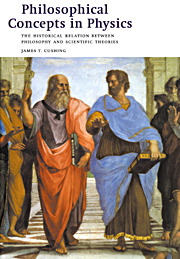 Philosophical Concepts in Physics
Philosophical Concepts in Physics Book contents
- Frontmatter
- Contents
- Preface
- Copyright acknowledgments
- PART I The scientific enterprise
- 1 Ways of knowing
- 2 Aristotle and Francis Bacon
- 3 Science and metaphysics
- PART II Ancient and modern models of the universe
- PART III The Newtonian universe
- PART IV A perspective
- PART V Mechanical versus electrodynamical world views
- PART VI The theory of relativity
- PART VII The quantum world and the completeness of quantum mechanics
- PART VIII Some philosophical lessons from quantum mechanics
- PART IX A retrospective
- Notes
- General references
- Bibliography
- Author index
- Subject index
2 - Aristotle and Francis Bacon
Published online by Cambridge University Press: 05 June 2012
- Frontmatter
- Contents
- Preface
- Copyright acknowledgments
- PART I The scientific enterprise
- 1 Ways of knowing
- 2 Aristotle and Francis Bacon
- 3 Science and metaphysics
- PART II Ancient and modern models of the universe
- PART III The Newtonian universe
- PART IV A perspective
- PART V Mechanical versus electrodynamical world views
- PART VI The theory of relativity
- PART VII The quantum world and the completeness of quantum mechanics
- PART VIII Some philosophical lessons from quantum mechanics
- PART IX A retrospective
- Notes
- General references
- Bibliography
- Author index
- Subject index
Summary
In order to contrast by means of specific examples two different ways of reaching general conclusions about the phenomena of reality, we compare the work of Aristotle with that of Sir Francis Bacon (1561–1626). As we shall see, the difference is one of emphasis and execution rather than of principle. Aristotle favors the discussion of general principles that can be arrived at on the basis of an intuitive grasp of natures, while Bacon stresses the importance of slow and careful induction from specific cases.
ARISTOTLE
Aristotle was born in 384 B.C. at Stagira, a Greek colonial town on the peninsula of Chalcidice in Macedonia on the northern shores of the Aegean. His father Nicomachus (d. c. 374 B.C.) was a physician to Amyntas II of Macedon (d. 370/369 B.C.), grandfather of Alexander the Great (356–323 B.C.). In 367 B.C. Aristotle, at age seventeen, came to Athens and began his studies as a pupil in Plato's Academy. Plato was at that time a man of sixty. Aristotle's life falls rather naturally into three major periods. He spent twenty years at the Academy until Plato's death (348/347 B.C.). The anti-Macedonian mood prevalent in Athens may have been partly responsible for his leaving that city and traveling for the next twelve years. In this second period he went to Macedon in 342 B.C. at the behest of Philip II (382–336 B.C.) to tutor that king's son, Alexander. During his thirteenth through sixteenth years, Alexander was taught by Aristotle.
- Type
- Chapter
- Information
- Philosophical Concepts in PhysicsThe Historical Relation between Philosophy and Scientific Theories, pp. 15 - 28Publisher: Cambridge University PressPrint publication year: 1998
- 1
- Cited by


